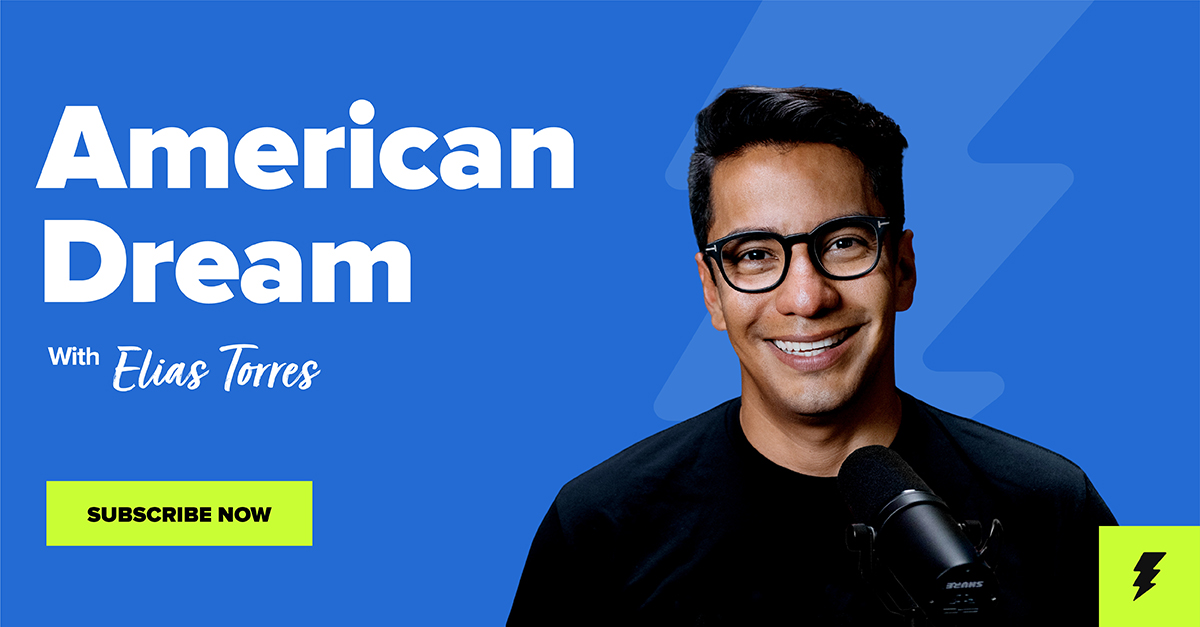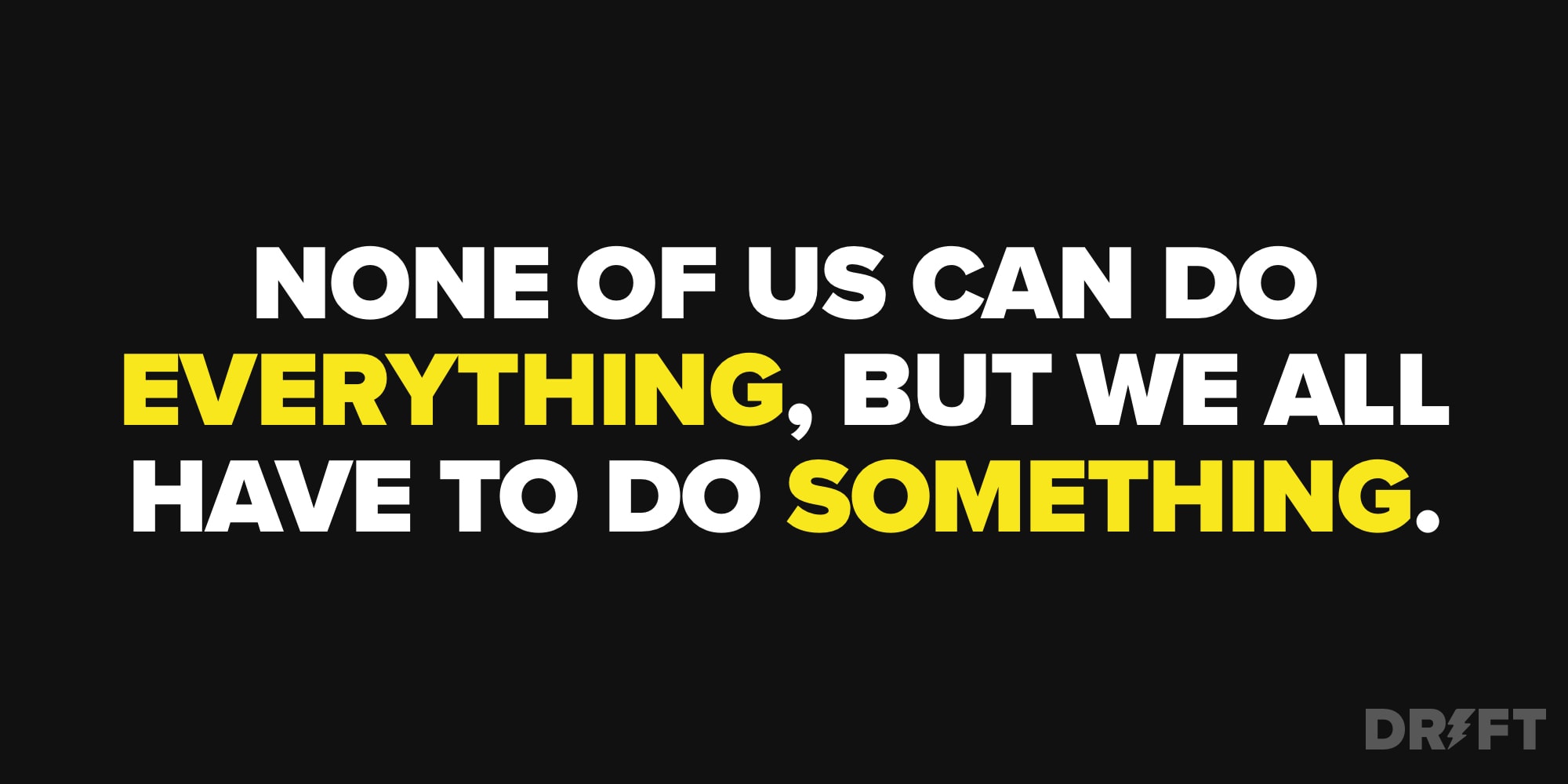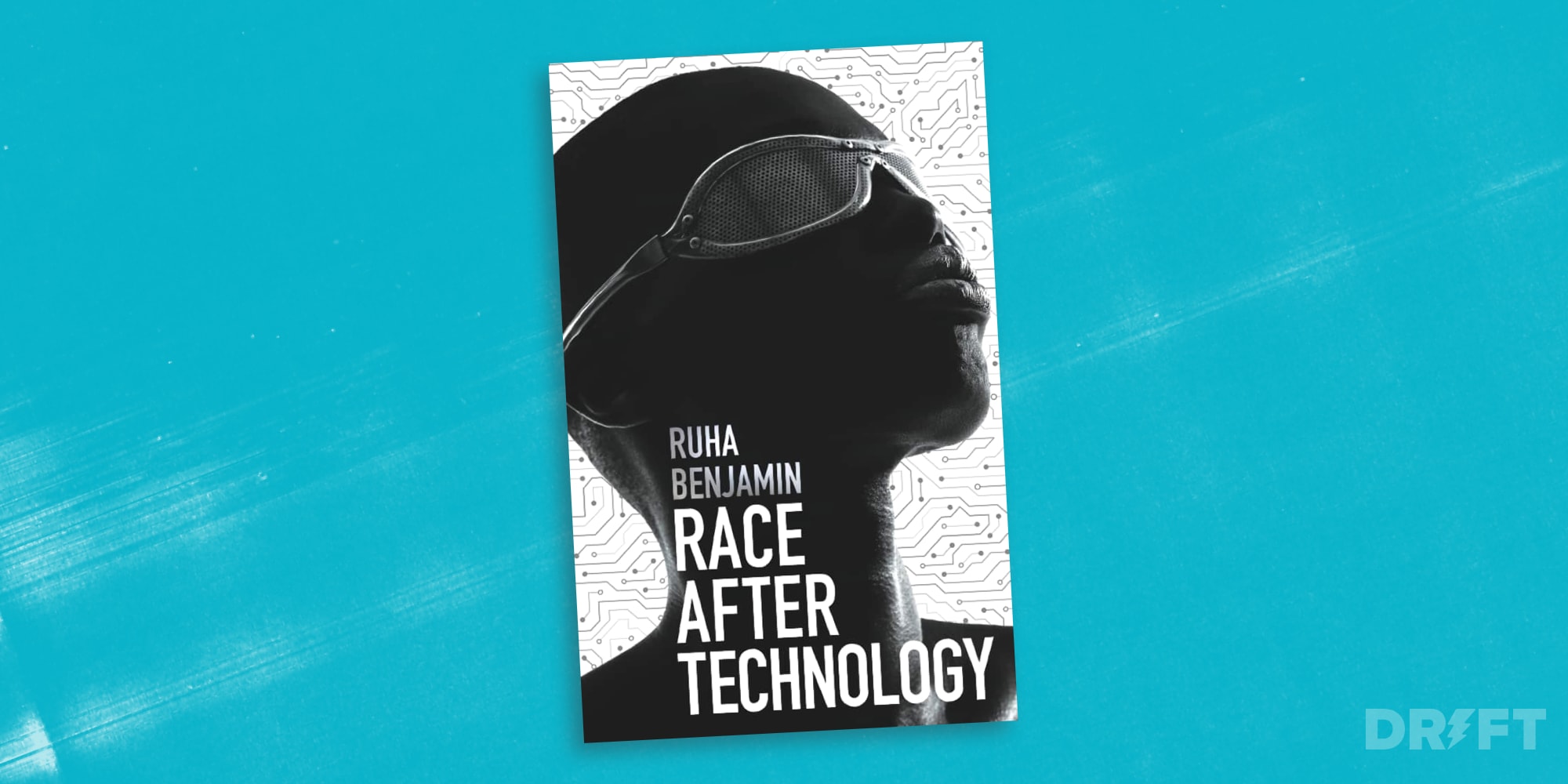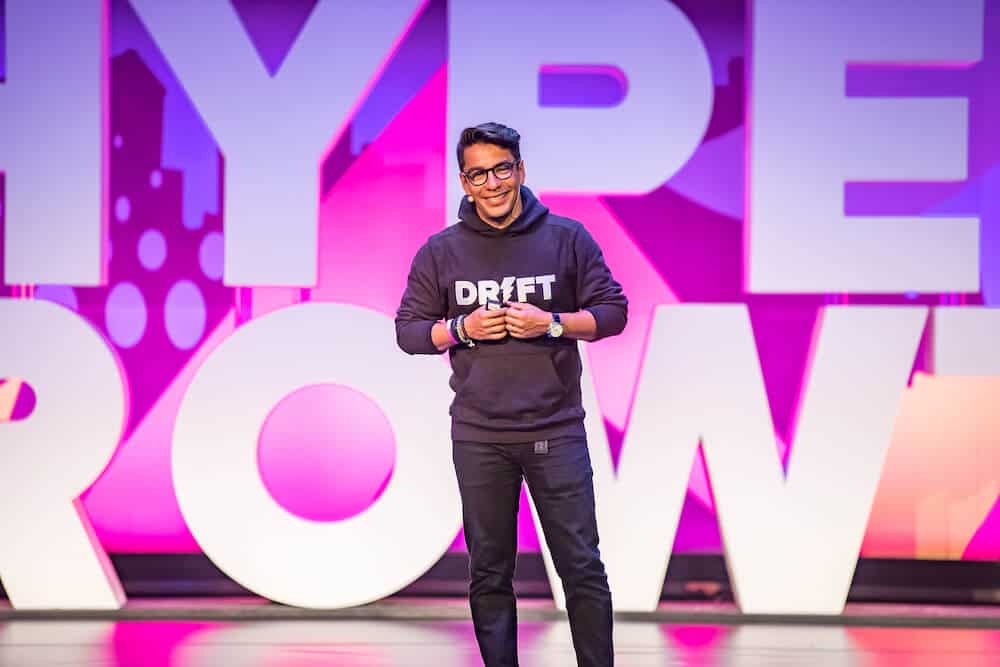Hey everyone, there’s a new Drift podcast on the block. We’re calling it The American Dream, and I can’t wait for you to hear all about it.
- Who’s the host: Drift’s co-founder and CTO, Elias Torres. If you know Elias, you know he’s gonna bring the passion – and the energy.
- What you can expect: Each month, Elias sits down for an honest, authentic, and inspiring conversation with underrepresented leaders in tech – like Cisco’s Maria Martinez, Outreach’s Manny Medina, ALPFA’s Damian Rivera, and more.
- Where you can listen: Anywhere you get podcasts – subscribe on Apple or Spotify, or listen on your desktop right here.
- When new episodes air: Once a month.
- Why we made it: As an immigrant to the United States, Elias met so many great mentors along the way who helped shape both his life and career. In The American Dream, he’s paying it forward to the next generation.
Episode #1: We Gotta Break the System
To kick off the first official episode of The American Dream, Elias welcomes David Cancel (Drift co-founder and CEO), and Dena Upton (Drift’s Chief People Officer) for a candid chat.
Elias and DC open up about what it was like for them growing up (Elias in Nicaragua and DC in Queens, NY), their experience being part of the just 2% of VC-backed startups led by Latin American founders, how Drift is addressing racism in the tech industry, and why, as Elias says, “we gotta break the system.”
Listen to the full episode below 👇
Full Transcript
Elias Torres: Hey there, this is your host, Elias Torres. You’re about to hear the first ever episode of my brand new podcast, The American Dream. This episode is an intimate conversation between myself, Drift co-founder and CEO, Cancel, and Drift’s Chief People Officer, Dena Upton. Together, we discuss our backgrounds, what it means to be a Latin American in technology, and how we’re addressing systemic racism in the industry and much more. But before we get to the show, did you know that you can get more insights like the ones we shared here deliver right to your inbox? Sign up for more insights and stories from Latin American founders and entrepreneurs at drift.com/american-dream. All right, let’s go.
Dena Upton: Elias and D.C. There’s a lot that people know about you, but a lot that they don’t. And I wanted us to use this opportunity to share a little bit about your background and journey and what it has all meant to you. So let’s start with a little bit of background, Elias. I know you presented at the last quarterly meeting, our last quarterly All Hands. Can you remind us about how you came to the U.S.?
Elias: How I came to the U.S. The story goes back to my grandmother, I would say, in 1975. I was not born yet. And she left Nicaragua as probably a 65 year old woman, and she took some bus and she just rode from Central America all the way to the Mexican border. And she crossed the river with a coyote. And she told me once I saw her in San Francisco, I first visited San Francisco to go visit my grandmother. She was a nanny there, but she told me about coyotes, helicopters, and a lot of stress, a lot of danger. Very, very crazy story of how she crossed the border. And then 30 something years later, 35 years later, because she became a citizen barely speaking English she was able to get us a green card. If it wasn’t for her, I could have not come to this country when I was 17 years old in 1993.
Elias: So I came as an immigrant, had a green guard. Could come on a plane. Didn’t have to be worried. I had this card that I felt comfortable. I came before on a trip where I had to have stories prepped so I didn’t get kicked out. This time, I felt confident. So, that’s a separate story. And so I came to this country as an immigrant, but legally, so I could work, I could attend school, I could apply for scholarship, and that’s how my journey began. Lived in an apartment in Tampa, Florida that was subsidized by the government, food stamps. And that was the beginning. And I even cleaned corporate offices at night. And so I think that’s the beginning of the journey of how I came to this country. Very little, not a lot, just my mother and my two other brothers. And began to that point until I’m here with you guys. So that’s the short version of that story.
Dena: Thanks, Elias. And DC, your story is a little different. Can you tell us about…
Elias: He grew up rich in New York in Queens.
David Cancel: I was the son of a sharecropper. No, definitely not rich. I was born in the Bronx, new York, so I didn’t immigrate here. I was born here. Where I grew up, you probably couldn’t tell the difference. Everyone only spoke Spanish 100% where I grew up. It was the South Bronx, New York in the 1970s. If you don’t know what that means, you can look it up. All the neighboring buildings looked like they were in Beirut. So they were bombed out and they were empty. And so, anyway, I grew up in the South Bronx and then I moved to Queens, and I moved to a nice neighborhood in Queen. But I only was able to do that because my dad took a job where they gave free housing, and so I moved to Queens and then I became the only person who looked like me in Queens because my neighborhood was 100% Jewish where I lived, and then 50% Irish and 50% Italian in the other half in the neighborhood.
DC: Anyway. But when I moved there, I only spoke Spanish because I didn’t need to, because that neighborhood I grew up in, in the Bronx was, like I said, 100% Spanish. You would even go to buy Chinese food and all the people from who worked there who were from China, they only spoke Spanish and they spoke so well if you talked to them on the phone you would think that they were native, that they were Puerto Rican, which is what most of the people there were. Anyway, so I moved. I learned how to speak English watching TV and movies, Gilligan’s Island, Brady Bunch, Facts of Life, many other things, Bugs Bunny cartoons, Woody Woodpecker. That’s how I learned English, because I always say, when I grew up, if there was ESL, I never heard of ESL. ESL didn’t exist where I was. You were just thrown in and basically expected to learn.
DC: And so that’s why we have so many similarities in our lack of being able to tell a proper metaphor or analogy when it comes to Elias and I. Because we’ve learned English pretty much the same way. And then was raised pretty much by my mom. My mom was a seamstress and she worked from home. And so luckily, I had her around all the time. And then that was the early beginning of my story. I was the surrogate father to my brother and to my sisters, then in some ways to my mom. So that’s my story.
Dena: DC, you said that your heritage, isn’t something that you thought about until the last few years. Why is that? What changed and what does Latin X mean to you now?
DC: Hmm, that’s a good question. I mean, it started when I met Elias over 10 years ago. But I really didn’t think about it until this company, I think, until Drift, so a little over five years ago. Frankly, now that I can look back and make sense on why I didn’t know why I’d never really placed an emphasis on it, it was just because I was always the other. I had never had a choice to think that way. Until I worked with Elias, I always said I’d never met another person who was Latin who was in the industry that it was in. Zero. I mean, obviously, they existed somewhere, but I didn’t know them. Even though my first company was in New York City, my first two companies were in New York City, and then the rest in Boston, I had gone 10 or 12 years into my career without ever even knowing another person like me.
DC: Remember, these are times before Instagram and LinkedIn so I couldn’t go search and find them or Twitter or any of these things. And so I never really, in some ways, had a choice. And so I think, in some ways, maybe I should have, but if I would have spent more time thinking of it, I think I might’ve just been crippled from not having role models and not being able to see myself doing certain things. So I ignored it and just focused on getting things done and being able to do the things that I did despite everything. And so, obviously, there was racism all around me every single day, but I didn’t have the luxury in my mind to think about it and to let it cripple me. And so it was really when I got into a place where I felt more comfortable and where I had more resources, I didn’t have to worry, and that I had a role model.
DC: And then I had lots of role models and I had a partner like Elias that I could actually spend time really thinking about, how do I give back? How do I give other people role models? But I definitely didn’t have any growing up.
Dena: I know you both have spoken about systemic racism, and Elias, I know you recently wrote an article about how, even though you are a URP yourself, you had to educate yourself on racism and the experience of Black men and women. As you’ve mentioned, you’ve experienced obstacles related to race and discrimination. Can you give us some examples? And how did you deal with that?
Elias: The thing I would say is that, remember, like I grew up in Nicaragua where I showed you a picture of Communist revolutions, people with AK-47s, you get beat up on the street. It’s lawless. We’re spoiled here that we complain about, I don’t know what we complain about. I didn’t have power all the time that we have here. “Oh my God, I don’t have power.” And Jimmy K. goes to the south end. I’m not trying to pick on Jimmy. But he goes to the other headquarter. I didn’t have power every day. I didn’t have water or power. The electricity would just kick in and then we’re like, “Oh, let’s watch TV. Let’s do something with electricity.” When you grew up like that, you come to this country and you have a different level of resilience and whatever comes, I don’t complain.
Elias: Somebody mistreated me, give me a microaggression in the workplace, just rolls off. That’s what I say to people, “I don’t easily get offended, contrary to my reaction and aggressiveness and intensity.” And so that was the big awakening for me. I’ve gone all my life, 40 years in this country, and I never care when anybody discriminated against me. I don’t give a shit. Whatever they do it is not going to stop me. My gain was I came to this country, I was less and whenever I inch forward on that, that was my gain. So I never thought about it. But it is until now that I realize how bad it is and how unfair it is and how no matter how hard we will work, people of color, we can’t overcome this because there is a system blocking it and there’s no change. And so that is the realization I got this year.
Elias: Before, as a person individually, I didn’t care. I was going to overcome it myself. But now we’ve got to break the system. And this is not just happened to Latin Americans, but it’s even worse for African Americans. And so that was what I’ve learned this year and it’s just been a journey of educating myself and understanding the journey that we’re in as a country. But I think it’s coming to light and it’s exciting that at least more and more people are aware. More people want to help bring change into this.
Dena: So I’ll ask both of you this question. Elias, this question came up in a video shoot with you the other day, but I’d like to pose a question to both of you. What is one of the most significant challenges you’ve faced in your life? And how did you overcome those challenges? DC, maybe we’ll start with you.
DC: I have so many. I don’t know. Not growing up with a father. I don’t know. That’s a pretty big one. But they’re endless. I could go on forever. But that’s probably the one that’s probably impacted me the most.
Dena: How did you overcome it?
Elias: That’s exactly the same way I feel about it.
DC: I’m still overcoming it.
Elias: I’m still overcoming it. I was being recorded for this video to inspire Latin youth to take risks, and that’s what I suggested at the end. I started talking about I had an alcoholic stepfather. It was fucking chaos at home. We had no money. My house burned down. I remember running out in my underwear one day and the whole house burned down and everybody in the neighborhood …
DC: That’s a visual.
Elias: That’s a visual. It’s crazy stuff. I mean, it’s like coming here illegally, coming here illegally, food stamps, applying for college when your family tells you your best job you could get his support for the post office because they have great pension plans.
DC: Mine was the garbage department, New York City Department of Sanitation.
Elias: Exactly. I live in Boston and I can’t afford to buy a house in this place, it’s so expensive. I’m just shipping to Florida. I was stuck in here, and I’m like, “Let’s just go to Florida. Everybody there has a nice house. Let’s just gave up on this.” And then I’m going to quit IBM and I’m going to go work with David and there’s only 10 people, and then 2008 crashes. I don’t know. When a financial advice who told me, he was from college and he’s trying to get me to work with him, and he goes through my budget and he says, “You have no money. You spend more than you make.” And he hung up on me. He called me later on and he was like, “Hey, I saw something in the news. We should talk.” And I’m like, “Fuck you.” Every single thing is a hardship. I don’t know. It doesn’t get any better. Working and running Drift is hard. It’s hard. It’s hard. Everything is hard.
Elias: But I am thankful that I have had the health and the energy and the team and the support to take on these hardships. Now I have people that have helped me. I can’t complain it. It hasn’t been all just getting kicked on the ground, but it’s been a lot of people that have made a huge difference in my life.
Dena: You both have children. How do you talk to your children about their heritage, your heritage?
DC: I don’t even know how to answer that. I mean, we talk about it all the time. But the reason I say that is that they grew up in an entirely different context. You hear a little bit, a little tiny glimpse into Elias’ context and my context, but it’s just totally different. It’s a totally different time and place. My daughter is the boss of all bosses. She is more driven. I always say, next to my daughter, who’s 15 now, I’m a lazy sloth. I’m just the laziest do nothing sloth. And Elias says he has similar daughter. They’re way, way, way ahead of any of our thinking. I didn’t have the luxury of my daughter’s thinking on the context until probably 10 years ago, at best. And I’m being generous for myself. We talk about it all the time, but they’re in a much more advanced state than I ever was.
Elias: I lose my shit on my kids all the time, because there’s just no context. It’s just impossible to pass down the context of my experiences to them. My son somehow, my wife is probably included in this, ends up buying this very expensive hat. It’s a big brand. I wouldn’t even go into the specifics of prices. I just totally lost my shit. I was like, “Come over here. Let’s talk about this hat. You have no sense whatsoever of what things cost.” And we spent a whole afternoon doing math and talking about jobs and salary and expenses. At what point in his life was he going to go and spend this much money on that hat? Where is the extra income? How do you even add this thing up? And so those are the kinds of lessons that I try to give them. It’s like, “You can’t get a phone unless you build an app. You can’t do this. You’ve got to do the dishes every night.”
Elias: My daughter, the other day, we woke up and the worst thing to wake up, for my wife especially, is when the kitchen is just a total disaster. And that’s their job, the three of them have to clean the entire kitchen every night. You’ve got to do some work. And they say, my daughter’s like, “Oh, I tried it. It was 1:00 a.m., and Noah was sleeping.” And I’m like, “No excuses. Practice extreme ownership. I just don’t care. You get up. Wake him up. Wake me up. This is your job. It doesn’t matter that you’re not getting it done.” So just like you guys get it from me here, my kids get it. And I’m just fighting every day so they go this world and they’re rugged, they’re hard, they’re not spoiled, they’re not entitled.
Elias: Even though they are extremely spoiled and entitled. And so we just trying to expose them to as much as we can because I just want them to be humble, to be hardworking, to have great ethics and great discipline. That’s what us parents we want. So I give them a lot of shit.
Dena: One final question from me, this one’s for DC. So at Drift, we focus on supporting STEM related nonprofits, Hack Diversity, Wall Breakers, Build, and others. Our board is very supportive of those organizations as well. Why the focus on STEM and future generations? Why is that, DC?
DC: It’s a super important one for me at Drift but also personally, because I think when you want to invert a problem and try to figure out, how do we solve this systemic problem that we have? To me, the real answer is that we have to go not to the current generation, but we have to go to the future generations and start working there. So we all complain about diversity, and specifically within STEM, but just in general as well so we don’t go back to, how do we solve this problem? We all want an initiative, we want to hashtag, we want a lovely little avatar icon that we can put on, and those things are important to speak up, but those things are not going to affect the system that we’re in. So I think, for us, we say, “Okay, how do we get more people in STEM?”
DC: It’s not by talking to the same kids who are in college already, who are already elected to not be in STEM or to be in STEM. But it is to focus on high school, middle school, the youngest that we can, and try to change those people and try to get more of those people to come into STEM and for us to be closer to the next generation of folks. The non-sexy answer is that it’s going to be a multi-generational shift, and for some of us who have lived long enough, we’ve seen massive changes, which is very easy to discount because they’re never good enough and it’s never fast enough. But the world is completely unrecognizable to me from when I was coming up to where it is now. And it will be for our kids and their kids, and it will continue. It’s a long line of progression, which is like my talk today.
DC: There’s going to be lots of dips. We’re, as a country, in a dip right now, and it will be painful and then we’ll hit this next stair step of growth, and then we’ll have another dip and it’ll be painful again. History has taught as this over and over again. It’s amazing that most of us want to ignore those lessons of history and think that it’s going to be a magical new way to do these things. But it’s longterm investment over a long period of time and then you’ll see compounded returns over time. And there’s never been any other way.
Elias: Thanks for listening to The American Dream. Let me know what you thought of this episode by tweeting me @EliasT. Be sure to hit subscribe and leave a five review. If you’re looking for more leadership insights and stories like the ones you just heard, sign up for my series, The American Dream, at drift.com/american-dream. Every quarter, you’ll learn how Drift is progressing towards our mission of remaking the face of corporate America. And you will get insights from amazing Latin American and entrepreneurs of color and leaders like Manny Medina of Outreach, Maria Martinez of Cisco, and many others along with curated content, news, events and ideas delivered straight to your inbox. Don’t forget to sign up.









